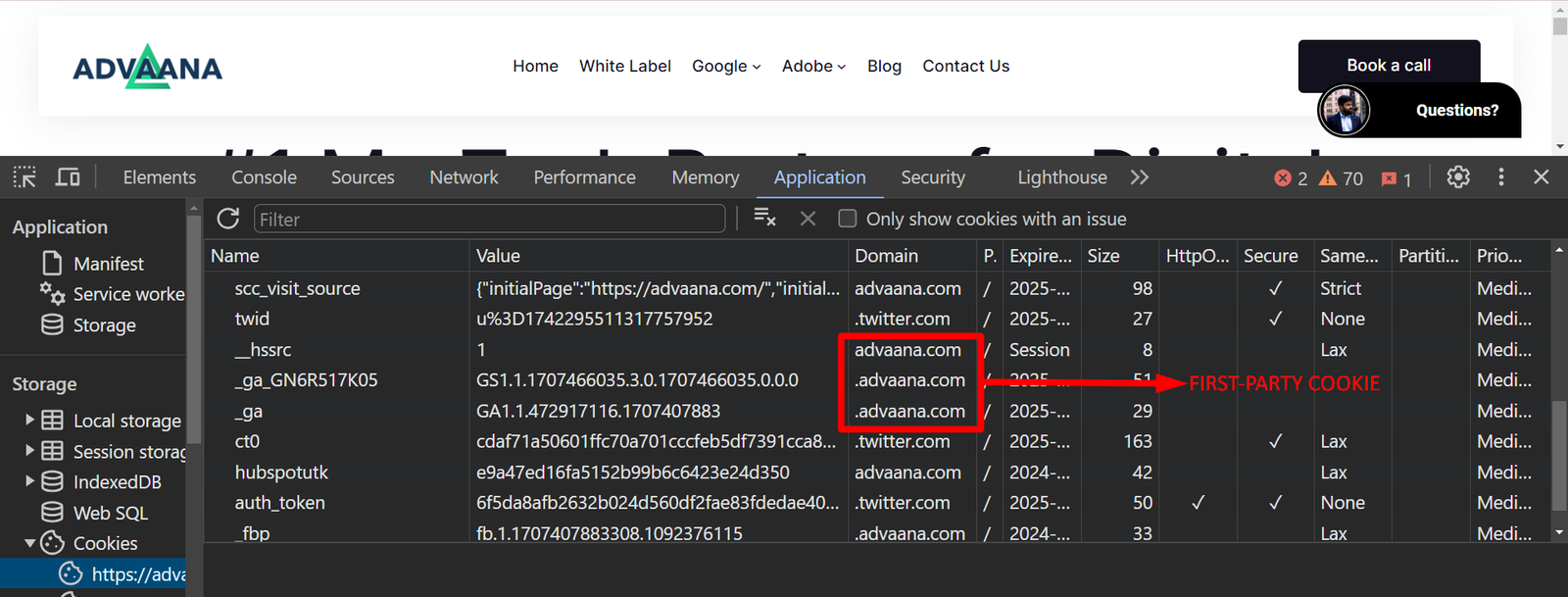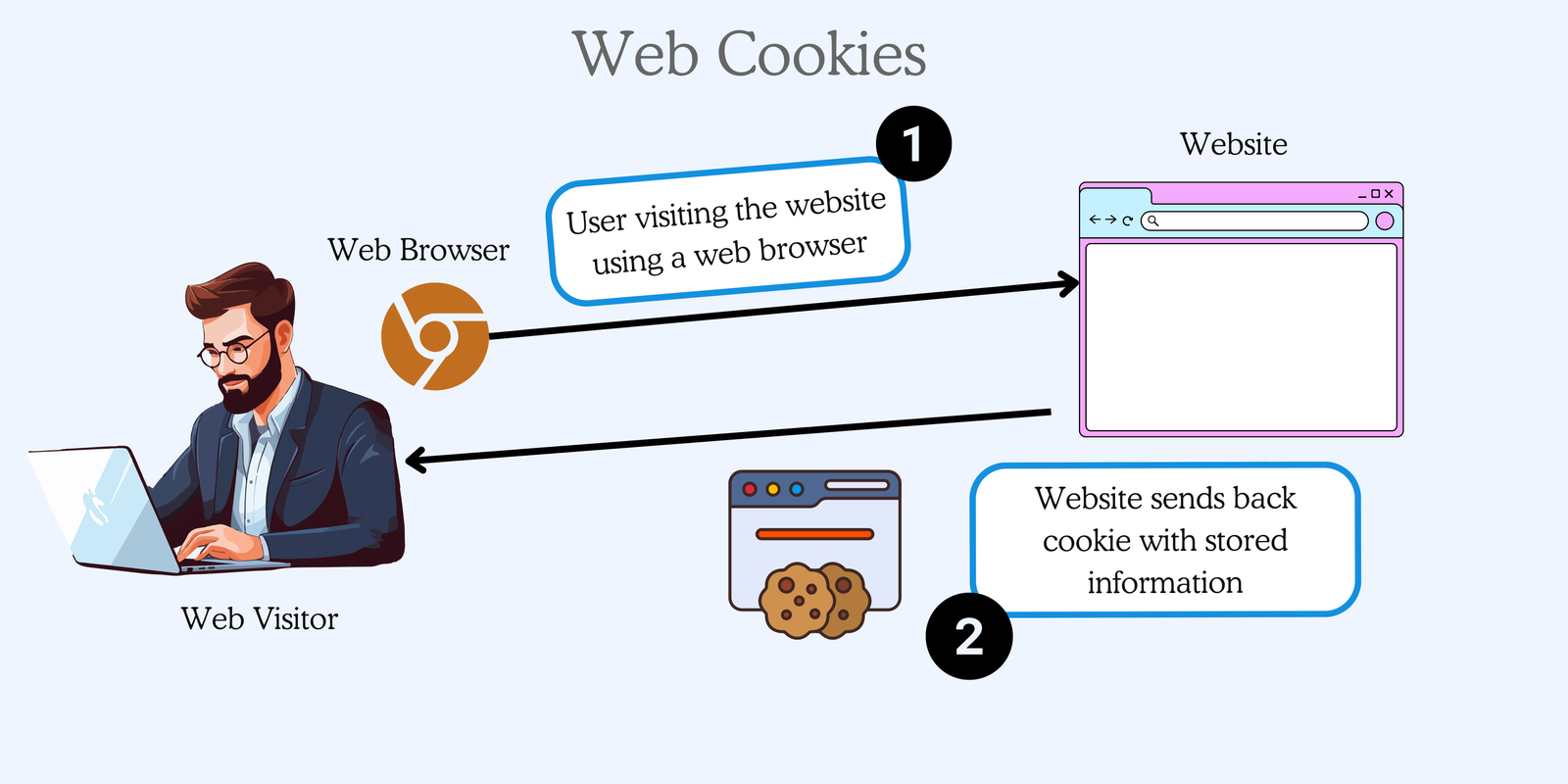In the digital world, website cookies hold a similar promise – offering convenience and personalization. Browser restrictions are tightening their grip, leaving businesses scrambling for alternative solutions. This article dives into the fascinating world of website cookies, exploring their importance, potential pitfalls, and the exciting alternatives emerging in a cookie-less future.
Key Takeaways
- Understanding on the what is website cookies
- What are cookies used on the website
- Types of Website cookies
- Use of website cookies
What are the Website Cookies?
Those little pop-ups asking you about “cookies” aren’t referring to delicious baked goods! In the digital world, cookies are something different: small files stored on your device by websites you visit. Think of them as digital reminders that help websites recognize you and remember your preferences.
Each cookie has a unique ID, like a tiny fingerprint, that identifies your browser or device. These handy helpers have two homes: one on your device and another on the website itself.
What are Cookies Used for on Websites?
For users:
- Convenience: Remember login details, shopping cart items, and site preferences, saving you time and hassle. Imagine logging in to your favorite online store every time you visit!
- Personalization: Tailor content and recommendations to your interests, making browsing more enjoyable and relevant. Imagine seeing ads for things you actually care about.
- Improved Functionality: Enable features like live chat, remember your place in a video, or adjust website settings to your liking. Imagine resuming a movie where you left off without having to scroll through the entire length again.
For Website Owners:
- Understanding User Behavior: Track how people interact with their site, leading to better design and user experience. Imagine knowing which sections are most popular and making them even better.
- Targeted Advertising: Deliver relevant ads to the right people, increasing efficiency and effectiveness. Imagine seeing ads for travel deals if you’re browsing travel blogs, instead of unrelated products.
- Performance Measurement: Track the success of marketing campaigns and website features, making informed decisions for improvement. Imagine understanding what marketing tactics are working best and investing resources wisely.
Types Of Website Cookies
Website cookies have various types and functions. Let’s explore them based on different categorizations:
- Cookies By Party
- Cookies By Category
- Cookies By Security
Cookies By Party
There are two types of this category and they are described as mentioned below:
First-Party Cookies
- Set by: The website you’re currently visiting.
- Purpose: Remember your preferences and settings, keep you logged in, track your activity on the site, and analyze website performance.
- Examples: Keeping items in your shopping cart, remembering your login information, and understanding which pages are most popular.
- Privacy concerns: Generally less risky than third-party cookies, but they can still be used to track your activity on a single website.

Third-Party Cookies
- Set by: A different domain than the website you’re currently visiting. This could be an advertising network, social media platform, or analytics company.
- Purpose: Track your activity across different websites, build a profile of your interests, and target you with advertising.
- Examples: Seeing ads for products you’ve recently viewed on other websites, being able to share content from a website directly to social media, and tracking website traffic using analytics tools.
- Privacy concerns: More privacy-invasive than first-party cookies, as they can be used to build a detailed profile of your interests and online activity.

Cookies By Category
There are most common categories which are mentioned below:
- Strictly Necessary Cookies: Those are essential for the website to function properly and cannot be disabled. They are usually only set in response to actions you take that amount to a service request, such as setting your privacy preferences, logging in, or filling in forms.
- Performance Cookies: These website cookies collect information about how you use a website, like which pages you visit and how long you spend on them. This information is used to improve the website and make it more user-friendly.
- Functional Cookies: These allow the website to remember your choices, such as your language preference or the region you are in. This allows for a more personalized and user-friendly experience.
- Targeting Cookies: These are used to deliver advertising messages more relevant to you and your interests. They also perform functions like preventing the same ad from continuously reappearing, ensuring that ads are properly displayed for advertisers, and in some cases selecting advertisements that are based on your interests.

Cookies By Security
Protecting user data is very important, while essential for website functionality, can raise security concerns. Website owners, especially in light of data privacy regulations like GDPR and CCPA, must be transparent about different security levels.
This message effectively highlights the importance of website cookies security and mentions three key categories: HttpOnly, SameSite, and secure. However, it lacks specific details on each category and why understanding them matters.
HttpOnly:
- Protect against malicious scripts accessing cookie data, preventing attackers from stealing sensitive information like session IDs or login details.
- Recommended for containing any kind of user-identifiable data.
SameSite:
- Control when those are sent along with requests to avoid unauthorized cross-site tracking.
- Important for mitigating Cross-Site Request Forgery (CSRF) attacks.
- Choose the appropriate level (Lax, Strict, or None) based on your website’s specific needs.
Secure :
- Ensure that these are only transmitted over secure, encrypted connections (HTTPS).
- Essential for protecting sensitive data in transit, especially for login or payment information.
Use of Website Cookies
They play a crucial role in various aspects of your online experience, offering both convenience and potential concerns. Let’s dive into the different ways where it is used:
User Experience Enhancement:
- Personalization: These remember your preferences, like language, location, or theme choices, tailoring your experience to your liking.
- Session Management: These keep track of your logged-in status, shopping cart items, or form data, eliminating the need to re-enter information repeatedly.
- Analytics & Optimization: These track website usage patterns, helping developers understand user behavior and optimize the site for better usability.
Advertising & Marketing:
- Targeted Ads: These build profiles based on your browsing activity, allowing advertisers to deliver relevant ads across different websites.
- Conversion Tracking: These track whether users click on ads, helping marketers measure campaign effectiveness.
- Retargeting: These enable advertisers to show ads to users who previously visited their website, reminding them of their interest.
Security & Functionality:
- Authentication: These can store authentication tokens, allowing you to stay logged in without re-entering your password frequently.
- CSRF Protection: Certain These mitigate Cross-Site Request Forgery (CSRF) attacks, enhancing website security.
- Fraud Detection: These can help identify suspicious activity and prevent fraudulent transactions.
Conclusion
By delving into the different types of website cookies (first-party, third-party, etc.) and their uses, you gain valuable knowledge. You can then leverage this knowledge to manage your settings, making informed choices about the data you share and the online experiences you shape.
Remember, transparency and control are key. Seek out websites that clearly explain their policies and provide options for managing your preferences. By understanding and managing, you can navigate the digital world with confidence, enjoying its benefits while protecting your privacy.









Leave a Reply